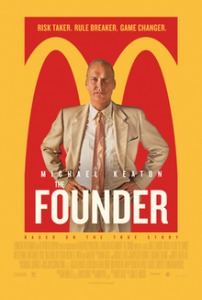The Founder
Posted on January 19, 2017 at 5:40 pm

McDonald’s began as a hamburger stand in San Bernardino, California, the idea of two brothers, Dick and Mac McDonald, who brought to food what Henry Ford brought to cars: ultra-efficient assembly-line production: consistent, reliable, and scalable. But McDonald’s, the worldwide “billions and billions served” fast food franchise phenomenon with the iconic golden arches was the creation of the man who put “founder” on his business cards, Ray Kroc.
Balzac famously said that behind every great fortune there is a crime, and this story of one of the great disruptive forces in 20th century business shows us the vision, the passion, the triumph and the heartbreak behind it. Michael Keaton is well cast as Kroc, a struggling salesman who listens to motivational tapes about the importance of persistence — a more significant factor, according to the lectures, than ability or resources.
Kroc is on the road trying to sell milkshake machines to restaurants. He calls his secretary for messages. A prospect says no. A bill collector wants to be paid. And some hamburger stand in California wants to buy six. Kroc is sure that is a mistake. No one has ever wanted more than one. He calls and speaks to one of the McDonald brothers. He can hear the activity in the background. And the order gets upped to eight. Kroc has to go see it for himself.
The McDonald brothers (John Carroll Lynch and Nick Offerman) welcome Kroc warmly, proud to tell their story and show off their innovations. In one of the movie’s highlights, they explain the trial and error and meticulous planning that led to their operational and conceptual innovation. They had three brilliant insights. First, they got rid of the inessentials: no wait staff, no plates to wash or break, and they limited the menu offerings to the items that were most often ordered. You want chicken — go somewhere else. They got rid of the cigarette machine and jukebox and thus got rid of the undesirable customers, teenagers and others who come to hang around instead of those who eat and leave. That left busy families, who appreciated the wholesome atmosphere and utter consistency and reliability. Second, they streamlined production, again reinforcing consistency and reliability and attracting families. One more difference to appeal to families: no waiting. Food was delivered almost instantly. Indeed, when on his first visit Kroc received his food neatly packed in a bag seconds after placing the order, he looked at it confused and asked, “What’s that?” The McDonald brothers realized they were not just providing customers with food; they were providing them with something even more precious: time.
The third brilliant insight created some conflict with their new partner after Kroc persuaded them to put him in charge of franchising. For the McDonald’s, money was not the top priority. They valued, well, values.
It is instructive that there are several points throughout the film where someone explains that McDonald’s is not about hamburgers. All of the other answers are right in their own way, along with many others. This is a rare film that looks at what it takes to create a globally dominant business, and what it costs as well.
Parents should know that this film includes one f-word, some predatory business behavior, illness, and marital strain and divorces.
Family discussion: How many things other than hamburgers did people say the business of McDonald’s really was? Why did Kroc call himself “founder?” Who was right, the brothers or Kroc, and why?
If you like this, try: “Tucker: The Man and his Dream” and “Joy”
